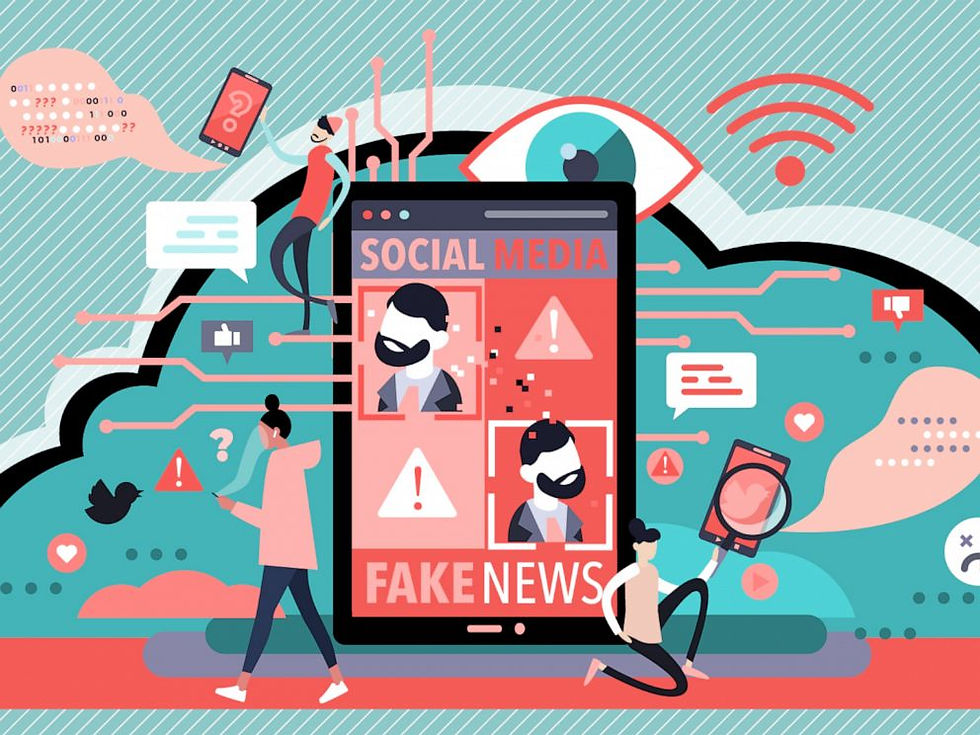Social Media's Effect on the Mind
- Ajay Kavuri
- Oct 28, 2022
- 3 min read

Aurora, IL
The creation of social media was an action that changed the world forever. Social media has benefited us greatly by opening the world to new opinions and facts. However, it has arguably also had a similarly monumental negative effect on the world by spreading fake news and attracting people to its inescapable web of endless scrolling. Social media has also impacted the minds of millions, becoming an everyday necessity for some. By taking advantage of people’s brains through social media, large companies like YouTube and Instagram are exerting even more control on our population in this new age.

The sole goal of social media companies is to keep their audience on the app/website for a longer period of time. This way, they can show more advertisements in order to make money. When scrolling through social media, your brain will be anticipating a reward–whether that’s watching the punchline on a TikTok, or making social connections on Instagram. These “rewards” also come in the form of notifications from all of your favorite apps. At this point, the mesocortical, nigrostriatal, and mesolimbic pathways of the brain are activated. While mindlessly scrolling, all of these pathways fire up and release dopamine, a hormone responsible for reward and motivation. In the absence of social media, your brain will release cortisol, a stress hormone, because of the increased dependence on social media that you are used to.
Social media companies, like Facebook, TikTok, and Instagram, know this and take advantage of it. A common buzzword in social media is “the algorithm”. The algorithm is just a complex program that takes in data about what a viewer wants to see and recommends more similar videos/stories. The algorithm is engineered to keep a user on the app as long as possible, to stimulate their neural pathways as long as possible. This way, the companies can play their advertisements and make money off people. Obviously, the dopamine rush that accompanies social media scrolling is irresistible to anyone, so they will want to do it again and again. In addition to dopamine, the cortisol produced in the absence of social media is another motivator for people to get back on that app.

However, there is another downside to the algorithm, besides addicting hundreds of millions of people to endless scrolling. Because it only recommends videos and stories that are similar to the ones that you like, it can bring the user down a rabbit hole of fake information. Once they get hooked on a particular topic that may or may not even be factual, the algorithm will make the user watch more of the same topic. Soon enough, the user will be surrounded by the same information, creating an echo chamber. This barrage of fake information can convince the user that the misinformation is actually true. Social media’s fatal flaw is exposing the world to nearly equal amounts of real and fake information. We can no longer differentiate between what is true and what is fake, what is right and what is wrong. Technology can and has helped humanity immensely in the past. But if technology is prioritizing watch hours over what’s right, then that is a huge problem in our society that could soon be poisoned with misinformation.
It’s not all doom and gloom though: there is a simple fix to this problem. On an individual level, we can try to limit our social media usage to a reasonable amount per day. We can experience and try to understand new viewpoints and opinions, reducing the effect that social echo chambers have on us. Trying to achieve social interactions outside of a six-inch screen can also help us, for it will reduce our dependence on online social media apps. Visiting friends and family and spending time outside has shown to also increase dopamine and endorphin levels while reducing those of cortisol. Thus, being mindful and doing everything in moderation, including social media, is key to living a healthy life.
REWARD yourself naturally with our latest educational STEME podcast on AI! Find it at anchor.fm/steme



Apply for ISO 13485 Certification : 2016 Medical Devices - Quality Management Systems with IRQS. iso 13485 certification 25+ yrs experience of handling 5k+ clients across the globe.